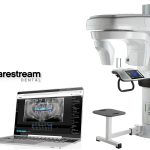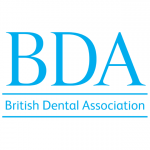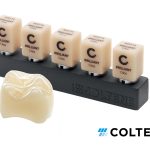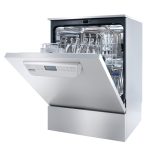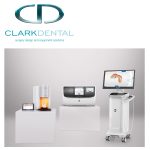Washer disinfectors are becoming commonplace in dental practices across the UK. While not yet mandatory in England and Wales, they are recommended to demonstrate best practice. Not only that, but they provide a range of benefits for the dental team, so all clinicians should consider making a washer disinfector part of their infection control protocols.
Prioritising cleanliness
Manually washing instruments was often the go-to method for ensuring items were appropriately cleaned prior to sterilisation in an autoclave. While some dental practices still prefer this method of cleaning, processing staff may be at a higher risk of a sharps injury, with the potential for the transmission of infection if the item they are handling contains contaminated blood/tissues. Past research has noted that sharps injuries are generally under-reported in the dental sector,[i] so it is difficult to know the exact statistics. Regardless, these injuries put staff members at risk of contracting infections such as hepatitis B (HBV) or hepatitis C (HCV). As such, the use of an automated system would help to reduce this risk, as it minimises hand-to-instrument contact.
Utilising a washer disinfector also helps to ensure your instruments have been thoroughly processed, as this system uses validated technology that makes sure every cycle is being processed to the correct standard. Instruments will be rigorously processed, going through various stages such as a pre-rinse flush, detergent wash, rinses and a thermal disinfection cycle to make sure contaminants and debris are removed. Finally, the drying stage also saves additional time for the team, as they will not have to delegate additional time to dry each instrument.
Are your records in order?
Maintaining high levels of infection control is the priority of all dental practices, and this includes ensuring that you keep accurate records that can be produced during an Audit. Certain washer disinfector models are able to keep precise processing and validation records with the use of data logging devices.
The use of a data logger is also recommended as way to demonstrate best practice, and clinicians should certainly consider utilising this method of recording valuable cycle information. Not only are you provided with additional security, but it also helps to save time for the dental team, as you will not be required to manually transfer the data.
It is worth mentioning that there is no effective way to validate whether manually-cleaned items have been processed sufficiently. Washer disinfectors from leading manufacturers will have a cycle validation feature, which grants you the peace of mind that your instruments have been thoroughly processed – it is as simple as loading the washer disinfector and letting it do the hard work for you
Protecting your system
Leading manufacturers will offer a service contract that makes protecting your washer disinfector easy and straightforward. Options such as unlimited breakdown cover, unlimited original manufacturer parts and labour, fully-trained engineers and even additional ECPD user training for the dental team are invaluable, and will give you the reassurance you need that in the rare event of a breakdown, you can get your system back up and running with minimal downtime. Moreover, you can rest assured that your process remains compliant.
The Miele PG8581 under bench washer disinfector from Eschmann provides an outstanding performance. This WRAS-approved unit can achieve heavy-duty cleaning, disinfection and drying in just under an hour, and also accommodates 360 instruments per cycle. Plus, the real-time wireless cycle data manager allows for the recording of all cycles, making cycle data recording much more efficient. The unit also comes with a unique dental cycle that is validated and compliant to HTM01-05 and SDCEP guidelines. You can protect your system with the fully comprehensive Eschmann Care & Cover service, which includes: Annual Validation and Pressure Vessel Certification, unlimited breakdown cover, unlimited Eschmann parts and labour as well as enhanced CPD user training.
An important system for your dental practice
All dental practices must be committed to providing outstanding patient care in a clean and safe environment. When you choose to invest in a washer disinfector, you gain the peace of mind that your instruments have been cleaned & thermally disinfected in a validated traceable cycle, keeping you, your team and your patients safe from harm.

For more information on the highly effective and affordable range of decontamination equipment and products from Eschmann, please visit www.eschmann.co.uk or call 01903 875787
[i] Trayner, K.M.A., Hopps, L., Nguyen, M., Christie, M., Bagg, J. and Roy, K. (2018). Cross-sectional survey of a sample of UK primary care dental professionals’ experiences of sharps injuries and perception of access to occupational health support. British Dental Journal, [online] 225(11), pp.1023–1028. Available at: https://www.nature.com/articles/sj.bdj.2018.1031#ref-CR6 [Accessed 2 Feb. 2023].





